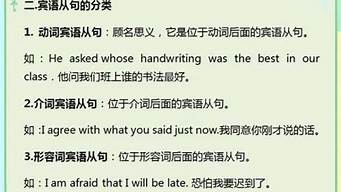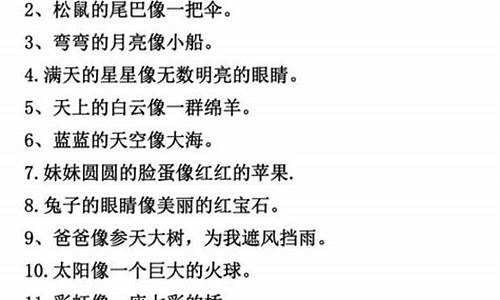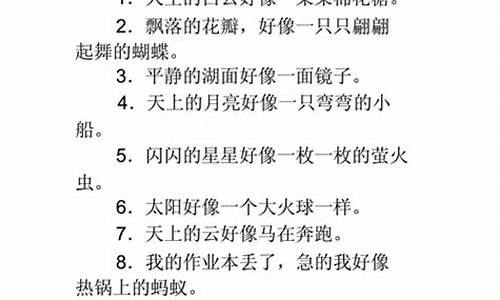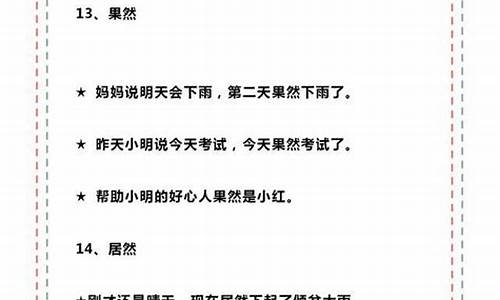您现在的位置是: 首页 > 成语歇后语 成语歇后语
求全责备造句后带宾语从句_求全责备造句后带宾语从句的句子
佚名 2024-04-26 人已围观
简介求全责备造句后带宾语从句_求全责备造句后带宾语从句的句子求全责备造句后带宾语从句是一个非常重要的话题,可以从不同的角度进行思考和讨论。我愿意与您分享我的见解和经验。1.宾语从句在复合从句中做宾语一般位于什么和什么之后2.有wheretherebe这种句型吗?3.makesbdone后面能否跟宾语从句
求全责备造句后带宾语从句是一个非常重要的话题,可以从不同的角度进行思考和讨论。我愿意与您分享我的见解和经验。
1.宾语从句在复合从句中做宾语一般位于什么和什么之后
2.有where there be这种句型吗?
3.make sb done后面能否跟宾语从句
4.初中英语宾语从句习题带答案的
5.收集好词带解释与造句

宾语从句在复合从句中做宾语一般位于什么和什么之后
He says that he is good at English.
及物动词(后) 宾语从句
The boy was interested in whatever he saw here.
介词(后) 宾语从句
有where there be这种句型吗?
1、I believe that you will succeed.我相信你会成功。
2、I believe that he can pass the exam.
我相信他可以通过考试。
3、I believe that they can come here.
我相信他们会来这。
4、I believe that it will be sunny tomorrow.
我相信明天是晴天。
5、I?believe?this investment will benefit our company in the end.
我认为,这笔投资将最终为我们公司带来利益。
6、I?believe?her to be the finest violinist in our country.
我相信她是我国最好的小提琴家。
7、I?believe?you have got a much cushier job than me.
我看你的工作要比我的轻松得多。
8、I?believe?she has more sense than that.
我相信她不至于连这点儿道理都不懂。
扩展资料:
believe:
一、读音:英 [b?li?v],美 [b?liv]
二、意思:
v.相信;确信;认为;以为;猜想;信仰;信任;信教;相信…的话;相信某人能做某事
三、例句:
She did not?believe?that marriage was the key to happiness and fulfillment.
她不相信婚姻是获得幸福和满足的关键。
四、用法:
1、believe的基本意思是“相信”,指相信事物的真实性或相信某人说的话,引申可作“信赖”或“信仰”解。
2、在口语里,,believe还可作“想”“认为”解,表示和缓的、不太肯定的口气,相当于suppose,有时则仅仅表示客气,不愿说得太绝对。
3、believe用作及物动词时,后面可跟名词、代词或that/wh-从句作宾语,也可接以that从句(表示将来)充当直接宾语的双宾语。
make sb done后面能否跟宾语从句
的确有 where there be 这种句型,该句型一般引导的是地点状语从句或者定语从句。
1 Where there is a will, there is a way. 有事者事竟成
此句中的 where there... will 是地点状语从句“在... 地方”
2 I want to work in a city where there is clean air and water.
此句中的 where there... water 是定语从句,修饰主句中的 a city
初中英语宾语从句习题带答案的
可以。 通常我们见到的 make sb do sth 是主动形式, to被省掉了
比如:The teacher made him wait outside.老师要他在外面等。 但是用于被动语句时,to要被还原。
比如:He was made to wait outside. 他被要求在外面等。
宾语从句怎么理解
1 一般 位于 谓语的后面的 是 宾语
2 有的谓语是实义动词并且是及物动词 或特殊的需加双宾语如 tell sb sth ,ask sb sth(或 make sb done, have sth done带有命令 使动的 意思 )
3 叙述 动作发出者具体的行为 4 有时介词的 后面 用宾语5 with 结构
宾语从句是 紧跟在宾语后的 具有 修饰宾语的作用 区分于宾补(补充说明作用)
宾从一般陈述句 的 形式 展开对宾语的修饰如 None of us knows( where these parts can be bought)做知道的宾语 知道是什么 很自然 问出来
make sth done和make sth do的用法区别
make sth/sb done表示被动,说明“sth/sb”是被动的完成某一动作
例:She can’t make herself heard in Chinese
她说的中文不能被理解
(“被理解”是被别人理解,不是“she”的主观动作)
make sb/sth do表示主动,意思正好与上面相反,在此举几个例子:
a. Nothing can change my mind
没有什么事情可以改变我的想法
b. What makes you say that?
你为什么这么说?(是什么让你这么说的)
PS:sb be made to do sth(表被动)
某人被强迫做某事(注意有“to”)
收集好词带解释与造句
1. Your T-shirt is so cool. Could you tell me ________? A. where you buy it B. where do you buy it C. where you bought it D. where did you buy it 2.—Excuse me .Could you tell me_____ I can get to the Space Museum? --Of course. You can take bus No.1. A. where B. how C. if D. why 3.—Do you know ________the new mobile phone last week? --Maybe 900 yuan. I’m not quite sure. A. how much she paid for B. how much will she pay for C. how much did she pay for 4. Michael Jordan has failed over and over again in his life.And that’s ____ he succeeds . A. what B. when C. why D. where 5. Alice in Wonderland is a fantastic movie. It’s about ______. A. how did Alice end the Red Queen’s reign of terror(恐怖统治) B. what did Alice end the Red Queen’s reign of terror C. how Alice ended the Red Queen’s reign of terror D. what Alice ended the Red Queen’s reign of terror 6. —Do you know ________the girl in red is? —I’m not sure. Maybe a teacher. A. when B. how C. where D. what 7.—What did your parents thank about your decision? --They always let me do _______I think I should. A. when B. that C. how D. what 8. I want to know ________. A. when we should arrive at the airport B. when should we arrive at the airport C. when the airport we should arrive at D. when the airport should we arrive at 9. --Would you please tell me __________? --At 10:00 this evening. A. when will the train leave B. when the train will leave C. when does the train leave 10.—Could you tell me________? --Fill in this form and I will give you a card. A. how I can meet Cathy B. where I can meet Cathy C. when I can meet Cathy11. –Do you know ________ the man with sunglasses is? -I’m not sure. Maybe a reporter. A. who B. what C. where D. how 12. -Tommy, do you know if Frank ________ to the zoo this Sunday if it ________? -Sorry, I have no idea. A. will go; is fine B. goes; is fine C. will go; is going to be fine D. goes; will be fine 13. No one can be sure_________ in a million years. A. what man looks like B. what will man look like C. what man looked like D. what man will look like 14. Sue told me that she _________ shopping with her sister the next day. A. will go B. would go C. goes D. has gone 15. The new-designed car is on show now. I wonder _________. A. how much it cost B. how much did it cost C. how much it costs D. how much does it cost 16. -When do you think _________? -About half past five. I will pick him up at the airport. A. he will come B. will he come C. did he come D. he came 17. Our teacher told us the sun ________ in the east. A. rise B. rose C. rising D. rises 18. --Listen! It is still noisy in the head teacher’s office. -Go and see ________ they have finished correcting the papers yet. A. though B. whether C. unless D. while 19. -What time will Mr. Brown be back to China? -Sorry. I don’t know ________. A. when did he go abroad B. why he is going abroad C. how soon will he be back D. how long he will stay abroad 20. –Do you know ________ the man with sunglasses is? -I’m not sure. Maybe a reporter. A. who B. what C. where D. how
1. Do you know _______ during the coming summer holiday? A. what will Tom do B. what did Tom do C. what Tom will do D. what Tom did 2. I want to know_________. A. what is his name B. what’s his name C. that his name is D. what his name is 3. Do you know ________ I could pass the exam? A. that B. whether C. what D. which 4. Jim doesn’t understand ____________. A. which is the way to the museum B. why his wife always goes shopping C. what is the way to the museum D. why does she always go shopping 5. ---Could you tell me ______ she is looking for? A. that B. whose C. who D. which 6. Mr. King didn’t know _______ yesterday evening. A. when does his son come home B. when his son comes home C. when did his son come home D. when his son came home 7. Could you tell me _______ the bike this morning? A. how does he mend B. how he mends C. how he mended D. how did he mend 8. ---I’m waiting for the mail. Do you know ________ it will arrive? ---Usually it comes by 4: 00. A. how B. where C. when D. what 9. ---Excuse me, would you please tell me ________? ---Certainly. Go straight along here. It’s next to a hospital. A. how we can get to the post office B. how can we get to the post office C. how get to the post office D. how could we get to the post office
10. ---Can I help you? ---Yes. I’d like a ticket to Mount Emei. Can you tell me ______ take to get there? A. how soon will it B. how soon it will C. how long it will D. how long will it 11. He wanted to know ___________. A. whether he speaks at the meeting B. when the meeting would start C. what he’s going to do at the meeting D. where would the meeting be held 12. ---Could you tell me _________ the Bamboo Garden? ---The day after tomorrow, I think. A. when will you visit B. when you will visit C. when would you visit D. when you would visit 13. Would you please tell me _________ next, Mr Wang? A. what should we do B. we should do what C. what we should do D. should we do what 14. You can’t imagine _________ when they received these nice Christmas presents. A. how they were excited B. how excited they were C. how excited were they D. they were how excited 15. I want to know ________ you will come back at 8:00 tomorrow. A. that B. when C. where D. whether 16. ---Could you tell me ____________? ---Sorry, I don’t know. I was not at the meeting. A. what does he say at the meeting B. what did he say at the meeting C. what he says at the meeting D. what he said at the meeting
17. ---Could you tell me _________ last night? ---Er, I was watching Euro 2004 at home. A. what you were doing B. what were you doing C. what you are doing D. what are you doing 18. The teacher asked the students __________. A. if they were interested in dinosaurs B. when was Albert Einstein born C. what they will do with the computers D. how many trees they have planted 19. Every morning the patients are asked if ________ their temperature taken. A. they had had B. have they had C. they have had D. had they had 20. It’s up to you to decide _______ you’ll go there, by air or by road. A. how B. why C. that D. when 21. He asked me ________ we could go to Beijing to watch the game by plane. A. that B. if C. how D. what 22. -Excuse me. Could you tell me ________? -Yes. There is a video shop next to the tall building. A. where can I buy some CDs B. where I can buy some CDs C. when can I buy some CDs D. when I can buy some CDs 23. I don’t know if my uncle ________. If he ________, I will be very happy. A. comes; will come B. will come; will come C. comes; comes D. will come; comes 24. My physics teacher said that light ________ faster than sound. A. travel B. travels C. traveled 25. You are growing so fast. Can you tell me ________ now? A. how fast are you B. how fast you are C. how tall are you D. how tall you are 26. -Excuse me, could you tell me ________? -Certainly. Go straight ahead and you’ll see it on your left. A. where the post office is B. when you will visit the museum C. where is the post office D. when will you visit the museum 27. I wanted to know ________, but no one would like to tell me. A. what did the old man say B. what the old man need C. what did the old man want D. what the old man meant 28. -Excuse me. Could you tell me ________? -Yes. There is a video shop on River Road. A. where can I buy some CDs B. where I can buy some CDs C. when can I buy some CDs D. when I can buy some CDs 29. -Do you think ________ a concert in our school hall this weekend? -Yes, there will. A. there will have B. there will be C. will there be D. will there have 1选C 2选B 3选A 4选C 5选C 6选D 7选D 8选A 9选B 10选A 11选B 12选A。结合题意“汤姆,如果天气好的话,你知道弗兰克这个星期六将去动物园吗?”可知第一个空是宾语从句,要用一般将来时,第二个空是条件状语从句,要用一般现在时,故排除B、C、D三项,选A。 13选D。从语序方面先排除B,另结合时间状语in a million years可知要用一般将来时, 14选B。结合主句中的told和从句中的the next day可知要用过去将来时,故排除A、C、D三项 15选C 16选A。问句是带有插入语do you think的宾语从句,要用陈述语序,先排除B、C二项;另结合答句中的will pick him up可知要用一般将来时,故舍D选A。 17解析选D。从句中所说“太阳从东边升起”是客观事实,所以不管主句用什么时态,从句总是用一般现在时,故正确答案为D. 18解析选B。考查whether引导的宾语从句。结合题意“去看看他们是否已改完了试卷” 19解析选D 20解析选B。四个选项都可以引导宾语从句,结合答语“Maybe a reporter.”可知问句是在询问人的职业,故正确答案为B。题意为“你知道那个戴眼镜的男人是做什么的吗?”。 习题练习习题练习习题练习习题练习 一. 1.C 2.D 3.B 4.B 5.C 6.D 7.C 8.C 9.A 10.C 11.B 12.B 13.C 14.B 15.D 16.D 17.A 18.A 19.C 20.A 21选B。考查if引导的宾语从句。结合题意“他问我我们是否能乘飞机去北京看比赛” 22选B。从语序方面先排除A、C二项;另结合答语“There is a video shop next to the tall building.” 23选D 24选B。“光传播的速度比声音快”是客观事实,故用一般现在时,light是第三人称单数形式 25选D 26选A。宾语从句必须用陈述句语序,故排除C、D二项;由答语“Go straight ahead and you’ll see it on your left.”可选A。 27选D。由语序先排除A、C二项,主句是一般过去时,从句应为相应的过去某个时态,排除B。 28选B。在宾语从句中,从句要用陈述语序。分析比较四个选项可先排除A、C;另结合答语“There is a video shop on River Road.”可舍D选B。 29选B。在宾语从句中,从句要用陈述语序,先排除C、D;另there be的将来时为there will be,
祸起萧墙:祸乱发生在家里,比喻内部发生祸乱。
积重难返 指长期形成的不良风俗、习惯不易改变
集腋成裘:狐狸腋下的皮虽然很少,但是聚集起来就能缝成一件皮袍。比喻积少成多。
计日程功:可以数着日子计算进度,形容数着日子算进度,形容在较短期间就可以成功。
济济一堂 :形容许多有才能的人聚在一起。
间不容发:中间容不下一根头发,比喻与灾祸相距极近,情势极其危急。
见仁见智:对同一问题,各人从不同角度持不同的看法。
见贤思齐:见到好的,优秀的,就向其学习,向其看齐。
矫揉造作:形容过分做作,极不自然。
矫枉过正 纠正偏差做得过了头
金科玉律:比喻不能变更的信条或法律条文。
噤若寒蝉:形容不敢作声。
敬谢不敏:谢,推辞;不敏,无能。表示推辞做某事的婉辞。错用于拒绝别人的要求
久假不归 长期借去,不归还
开卷有益:读书就有收获。开卷,打开书本,借指读书。
恪遵功令:严谨地遵守条令制度。
空穴来风:有了洞穴才有风进来,比喻消息和传说不是完全没有原因的。
苦心孤诣:费尽心思钻研或经营。孤诣,别人所达不到的。(中性)
狼奔豕突:狼和猪东奔西跑。比喻成群的坏人乱窜乱撞。(贬)
良莠不齐:一群人中有好有坏,侧重于品质。不用于水平、成绩等
临渊羡鱼 比喻只有愿望,不去实干,就无济于事
令人发指:发指,头发竖起来,形容非常愤怒。
另眼相看:用另一种眼光看待,多指看待某个人(或某种人)不同于一般。
门可罗雀 大门前面可以张网捕雀,形容宾客稀少,十分冷落。
门庭若市 形容交际来往的人很多。
面目全非 事物的样子变得很厉害,贬义.指变得很糟.
目无全牛:用来形容技艺已达十分纯熟的地步。(褒义词)
沐猴而冠 沐猴戴帽子,装成人的样子。比喻装扮得像个人物,而实际并不像
暮鼓晨钟 比喻可以使人警觉醒悟的话
南辕北辙 形容行动和目的相反
南辕北辙:心里想往南去,车子却往北走。比喻行动和目的相反。
泥沙俱下 比喻好坏不同的人或事物混杂在一起
抛砖引玉:自谦之辞,不能用于对方或第三方
蓬荜生辉:谦辞,表示由于别人自己家来或张挂别人给自己题赠的字画等而使自己十分光荣。
披肝沥胆:比喻开诚相见,也比喻极尽忠诚。
披沙拣金:比喻从大量的事物中选择精华。
萍水相逢:比喻向来不认识的人偶然相遇。
期期艾艾 口吃.不理解为懦弱犹豫等
杞人忧天:比喻不必要的忧虑。
前事不忘,后世之师 指记住过去的经验教训,可以作为以后的借鉴
黔驴技穷:比喻仅有的一点伎俩也用完了(贬)
罄竹难书:把竹子用完了都写不完。比喻事实(罪恶)很多,难以说完。
求全责备:苛责别人,要求完美 无缺。
好了,今天关于“求全责备造句后带宾语从句”的话题就讲到这里了。希望大家能够对“求全责备造句后带宾语从句”有更深入的认识,并且从我的回答中得到一些帮助。
下一篇:呕心沥血造句100字左右怎么写









